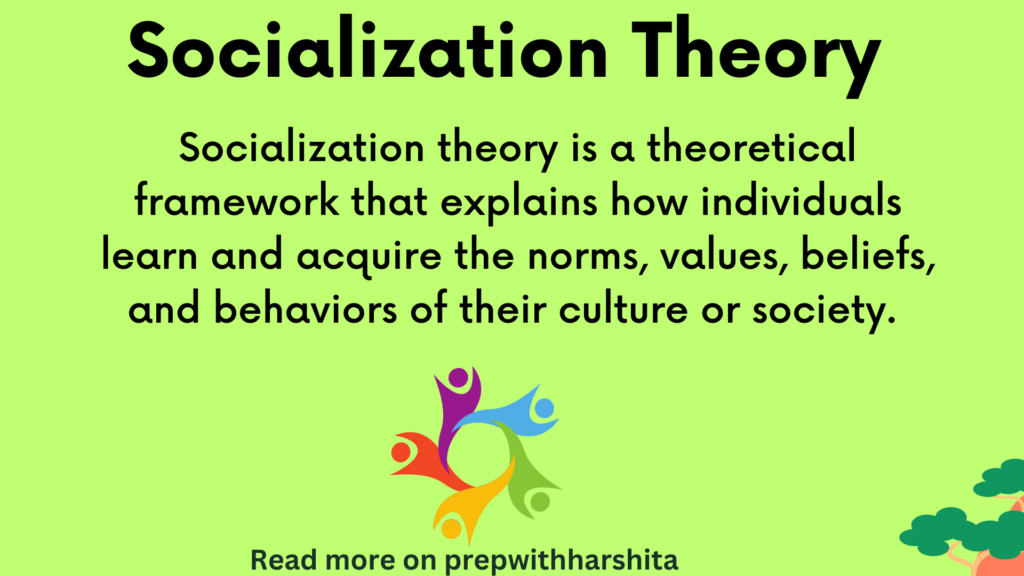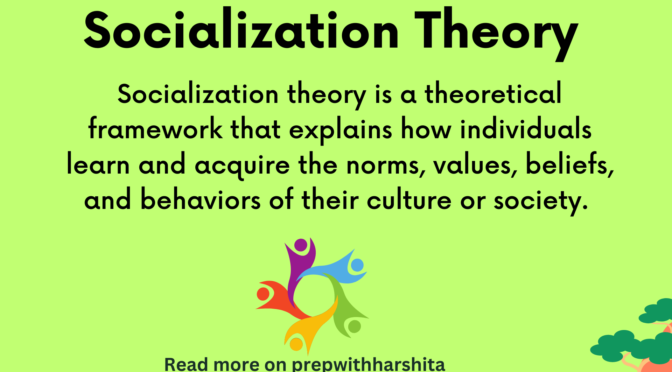Socialization theory is a theoretical framework that explains how individuals learn and acquire the norms, values, beliefs, and behaviors of their culture or society.
- It tell that socialization is a lifelong process that begins in childhood and continues throughout adulthood.
- The theory is grounded in sociology and psychology. It provides a framework for understanding how individuals become socialized into their culture and society.
- At the heart of socialization theory is the idea that individuals are not born with a pre-existing set of norms, values, beliefs, and behaviors, but rather they learn these through socialization.
- Socialization refers to the process by which individuals learn and internalize the cultural and social norms of their society.
- Socialization involves the acquisition of language, communication, and social skills, as well as the development of attitudes, beliefs, and values.
- Socialization occurs through interactions with the family, peers, schools, and other social institutions. These interactions shape the individual’s understanding of the world and their place in it. For example, children learn how to behave in social situations by observing and imitating the behavior of their parents and other adults. Similarly, children learn language by listening to and imitating the speech of those around them.
This Theory suggests that there are different stages of socialization, which vary across cultures and societies. In some cultures, for example, children may be expected to contribute to the family’s economic activities from an early age, while in other cultures, children may be encouraged to focus on education and play.
Perspective on Socialization Theory :
- There are different perspectives on socialization theory, including the cognitive development approach, the social learning approach, and the symbolic interactionist approach.
- The cognitive development approach emphasizes the role of cognitive processes in shaping socialization, while the social learning approach focuses on the role of reinforcement and punishment in shaping behavior.
- The symbolic interactionist approach emphasizes the importance of the meanings and symbols that individuals attach to their experiences and interactions.
Socialization Theory application in Indian Context:
Socialization theory has been widely applied in the Indian context to understand how individuals in India learn and acquire the norms, values, beliefs, and behaviors of their culture and society. Here are some examples of how this theory has been applied in the Indian context:
- Family and gender socialization: In India, socialization begins in the family, where children learn the norms and values associated with their gender role. Boys are socialized to be assertive, competitive, and independent, while girls are socialized to be nurturing, caring, and submissive. It is used to study how family and gender socialization influence individuals’ attitudes and behaviors in the Indian context.
- Caste socialization: Caste is an important aspect of socialization in India. Children are socialized into their caste from a young age and learn the norms and values associated with their caste. Socialization theory has been used to study how caste socialization influences individuals’ attitudes and behaviors in the Indian context.
- Education and socialization: Education is an important social institution that plays a key role in socializing individuals in India. Socialization theory has been used to study how education influences individuals’ attitudes and behaviors in the Indian context.
- Cultural values and socialization: India is a diverse country with multiple cultural values and practices. It used to study how cultural values and practices influence individuals’ attitudes and behaviors in the Indian context.
Also Read : Gender and Patriarchy

Also Visit : Prep with Harshita


Good day! This is my first visit to your blog! We are a collection of volunteers and starting a new initiative in a community in the same niche. Your blog provided us beneficial information to work on. You have done a extraordinary job!
My brother suggested I might like this blog. He was once totally right. This post truly made my day. You can not believe simply how so much time I had spent for this info! Thank you!
Wow, incredible blog layout! How long have you been blogging for? you made blogging look easy. The overall look of your web site is magnificent, let alone the content!
Elite Private proxy store DreamProxies.com – the best private proxies you’ll find for lowest rates!
QuickBooks Integrations Online Accounting Software Usa. Qbis Helps You To Sync Your Data With Quickbooks Online As Well As Quickbooks Desktop.
Quick Moderate Expert photo and video moderation & face recognition. Ensure content safety & compliance. Explore our services today.
My partner and I stumbled over here from a different web page and thought I might check things out. I like what I see so i am just following you. Look forward to looking at your web page yet again.